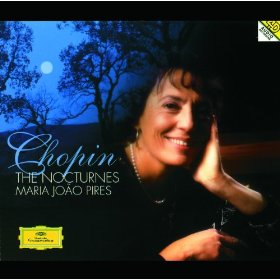Chopin Nocturnes
View record and artist detailsRecord and Artist Details
Composer or Director: Fryderyk Chopin
Genre:
Instrumental
Label: Deutsche Grammophon
Magazine Review Date: 10/1996
Media Format: CD or Download
Media Runtime: 109
Mastering:
DDD
Catalogue Number: 447 096-2GH2

Tracks:
| Composition | Artist Credit |
|---|---|
| Nocturnes |
Fryderyk Chopin, Composer
Fryderyk Chopin, Composer Maria João Pires, Piano |
Author: Bryce Morrison
Those of us fortunate enough to have attended Maria Joao Pires’s Wigmore Hall recital earlier this year were given a hint of the recorded greatness to come when she ended her programme with a memorable selection of Chopin Nocturnes. And now, listening to the complete set, in bold recordings of demonstration quality, one is made doubly aware of the most concentrated eloquence and pianistic mastery. Passion rather than insouciance is Pires’s keynote. Here is no soft, moonlit option but an intensity and drama that scorn all complacent salon or drawing-room expectations. How she relishes Chopin’s central storms, creating a vivid and spectacular yet unhistrionic contrast with all surrounding serenity or ‘embalmed darkness’. The con fuoco of Op. 15 No. 1 erupts in a fine fury and in the first Nocturne, Op. 9 No. 1, Pires’s sharp observance of Chopin’s appassionato marking comes like a prophecy of the coda’s sudden blaze. Such resolution and psychological awareness make you realize that Chopin, like D. H. Lawrence, may well have thought that “there must be a bit of fear, and a bit of horror in your life”. Chopin, Pires informs us in no uncertain terms, was no sentimentalist.
More intimately, in Op. 15 No. 3 (where the music’s wavering sense of irresolution led to the sobriquet ‘the Hamlet Nocturne’) Pires makes you hang on to every note in the coda’s curious, echoing chimes, and in the dolcissimo conclusion to No. 8 (Op. 27 No. 2) there is an unforgettable sense of ‘all passion spent’, of gradually ebbing emotion. Not surprisingly, given her general approach, Pires is drawn to No. 9 (Op. 32 No. 1), where an outwardly meek and Field-like demeanour is constantly menaced and thwarted, while in No. 13 in C minor, one of Chopin’s most sombre masterpieces, her sense of strength in adversity is overwhelming. Her emotional force in the concluding doppio movimento will surely bring tears to the eyes of even the hardiest, most seasoned listener. And since she is no less successful in the following, wistful F sharp minor Nocturne (always among Chopin’s favourites) and in the rich and fragrant pastures of Op. 62 Nos. 1 and 2, I can safely say that you will look far and wide for performances of greater poetic command and authority.
Just as Krystian Zimerman so startlingly re-evaluated the Debussy Preludes (DG, 3/94), more than proving that there is life after Gieseking, so Pires with her burning clarity has reinforced our sense of Chopin’s stature, created a new range of possibilities (showing us that there is life after Rubinstein). Naturally, Rubinstein’s legendary cycles possess a graciousness, an ease and elegance reflecting, perhaps, a long-vanished belle epoque. Yet moving ahead, as we all must, I have no hesitation in declaring Maria Joao Pires – a pianist without a trace of narcissism – among the most eloquent master-musicians of our time.'
More intimately, in Op. 15 No. 3 (where the music’s wavering sense of irresolution led to the sobriquet ‘the Hamlet Nocturne’) Pires makes you hang on to every note in the coda’s curious, echoing chimes, and in the dolcissimo conclusion to No. 8 (Op. 27 No. 2) there is an unforgettable sense of ‘all passion spent’, of gradually ebbing emotion. Not surprisingly, given her general approach, Pires is drawn to No. 9 (Op. 32 No. 1), where an outwardly meek and Field-like demeanour is constantly menaced and thwarted, while in No. 13 in C minor, one of Chopin’s most sombre masterpieces, her sense of strength in adversity is overwhelming. Her emotional force in the concluding doppio movimento will surely bring tears to the eyes of even the hardiest, most seasoned listener. And since she is no less successful in the following, wistful F sharp minor Nocturne (always among Chopin’s favourites) and in the rich and fragrant pastures of Op. 62 Nos. 1 and 2, I can safely say that you will look far and wide for performances of greater poetic command and authority.
Just as Krystian Zimerman so startlingly re-evaluated the Debussy Preludes (DG, 3/94), more than proving that there is life after Gieseking, so Pires with her burning clarity has reinforced our sense of Chopin’s stature, created a new range of possibilities (showing us that there is life after Rubinstein). Naturally, Rubinstein’s legendary cycles possess a graciousness, an ease and elegance reflecting, perhaps, a long-vanished belle epoque. Yet moving ahead, as we all must, I have no hesitation in declaring Maria Joao Pires – a pianist without a trace of narcissism – among the most eloquent master-musicians of our time.'
Discover the world's largest classical music catalogue with Presto Music.

Gramophone Digital Club
- Digital Edition
- Digital Archive
- Reviews Database
- Full website access
From £8.75 / month
Subscribe
Gramophone Full Club
- Print Edition
- Digital Edition
- Digital Archive
- Reviews Database
- Full website access
From £11.00 / month
Subscribe
If you are a library, university or other organisation that would be interested in an institutional subscription to Gramophone please click here for further information.




